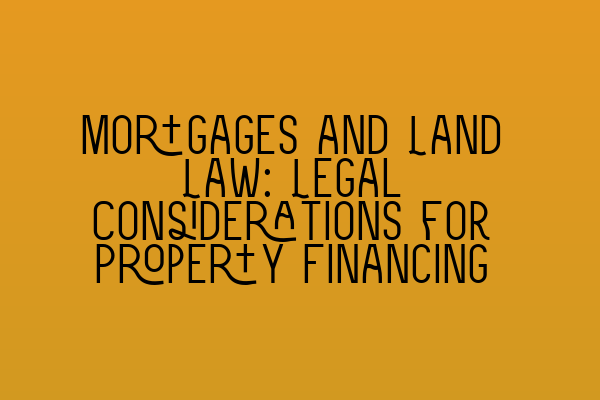Mortgages and Land Law: Legal Considerations for Property Financing
When it comes to property financing, mortgages play a crucial role in providing individuals with the means to purchase a home or invest in real estate. However, navigating the complexities of land law and understanding the legal considerations involved in obtaining a mortgage can be overwhelming.
At SQE Property Law & Land Law, we understand the importance of being well-informed when it comes to property financing. In this blog post, we will explore the legal aspects of mortgages and highlight key considerations that every prospective homeowner should be aware of. Whether you’re a first-time buyer or a seasoned investor, this article will help you understand the legal landscape surrounding property financing.
Before we dive into the legalities, if you’re currently preparing for the SQE exams, be sure to check out our related articles on SQE 1 Practice Exam Questions and SQE 1 Practice Mocks FLK1 FLK2. We also offer comprehensive SQE 2 Preparation Courses and SQE 1 Preparation Courses to help you succeed in your exam preparations. And if you need information on upcoming SRA SQE Exam Dates, we’ve got you covered.
Now, let’s explore the legal considerations of mortgages in land law.
1. Understanding Mortgage Agreements
A mortgage agreement is a legally binding contract between a borrower and a lender that allows the borrower to secure financing for a property purchase. It sets out the terms and conditions of the loan, including the loan amount, interest rate, repayment schedule, and any other specific requirements.
When entering into a mortgage agreement, it is important to thoroughly read and understand all the terms and conditions. Seek legal advice to ensure you are aware of your rights and obligations as a borrower. This will help you make informed decisions and protect your interests.
2. Property Valuation and Surveys
As part of the mortgage process, lenders require a property valuation to determine the fair market value of the property. This valuation helps establish the loan-to-value ratio (LTV) and ensures that the value of the property is sufficient to cover the loan.
Lenders may also require a survey to assess the condition of the property. The survey report provides important information about any structural issues, defects, or potential risks that could affect the property’s value or your ability to secure financing.
3. Title Searches and Due Diligence
Before granting a mortgage, lenders conduct thorough title searches and due diligence to verify the property’s ownership and assess any potential risks. This involves a comprehensive examination of the land registry records, planning permissions, easements, restrictive covenants, and any other encumbrances on the property.
By conducting these searches, lenders ensure that the property is free from any outstanding debts, legal disputes, or other issues that could impact their security interest. This step is crucial for both the lender and the borrower to ensure a smooth transaction and avoid any future complications.
4. Registration of Mortgages
In land law, the registration of mortgages is a vital step for protecting the lender’s interests and ensuring their mortgage takes priority over any subsequent charges or liens on the property. It provides a legal record of the lender’s security interest and establishes their rights in the event of default by the borrower.
In many jurisdictions, including the UK, mortgages are registered with the appropriate land registry office. This registration process involves completing specific forms, paying registration fees, and providing all necessary documentation. It is essential to follow the correct procedures to ensure the mortgage is valid and enforceable.
5. Mortgage Repayment and Default
Once a mortgage is in place, the borrower is responsible for making regular mortgage payments as outlined in the mortgage agreement. Failure to make these payments can result in default, which could lead to foreclosure or repossession of the property by the lender.
It is crucial to understand the terms of your mortgage agreement, including the consequences of default. Seek legal advice if you are struggling to meet your payment obligations or if you anticipate any financial difficulties. Your solicitor can help you explore options such as loan modifications, repayment plans, or refinancing to avoid foreclosure.
Conclusion
Navigating the legal considerations of mortgages in land law is essential for anyone considering property financing. Understanding mortgage agreements, property valuations, title searches, and the registration process will help ensure a smooth transaction and protect your interests as a borrower.
At SQE Property Law & Land Law, we are dedicated to providing comprehensive legal services and guiding our clients through the complexities of property financing. Contact us today to receive personalized advice and assistance from our experienced solicitors.
Don’t forget to check out our related articles on SQE 1 Practice Exam Questions, SQE 1 Practice Mocks FLK1 FLK2, SQE 2 Preparation Courses, SQE 1 Preparation Courses, and SRA SQE Exam Dates.
Disclaimer: This article is for informational purposes only and should not be construed as legal advice. Always consult with a qualified solicitor for personalized guidance and advice tailored to your specific situation.
